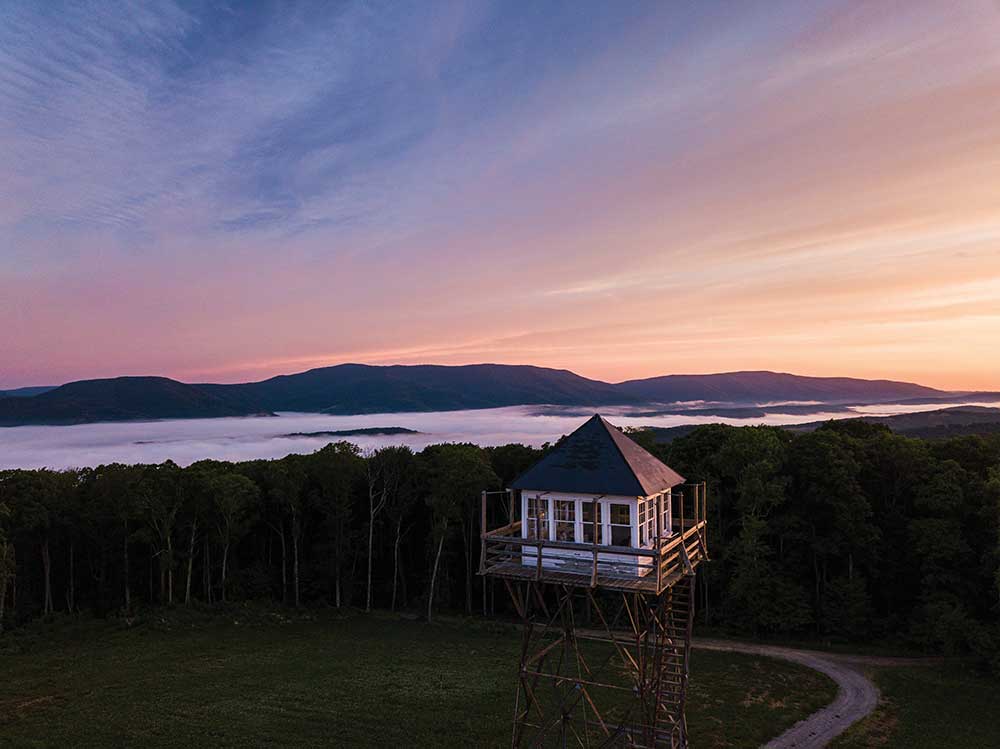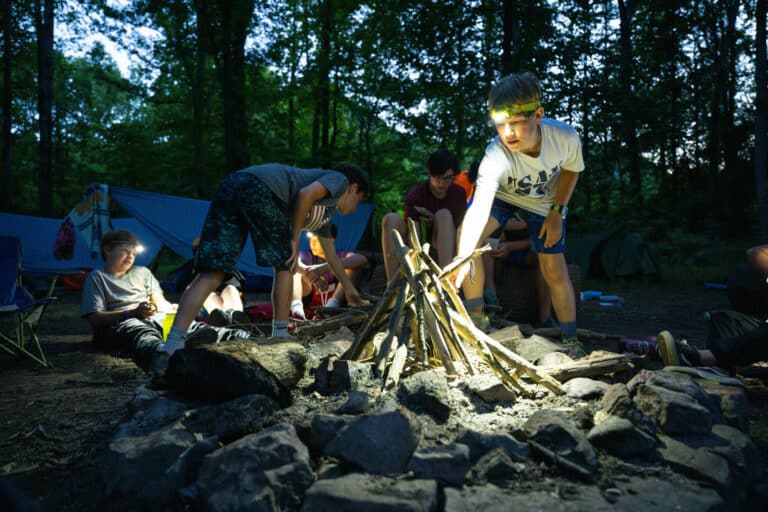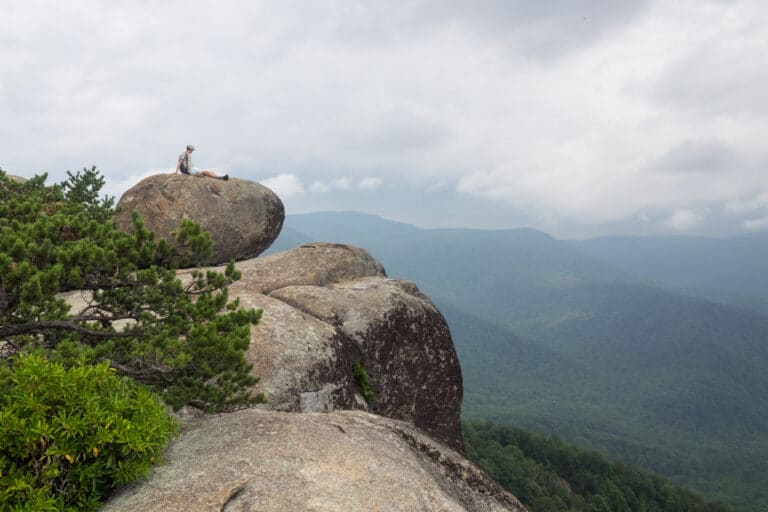The Thorny Mountain Fire Tower in Seneca Rocks State Forest, W.VA., offers accommodations 65 feet off the ground.
Looking to plan an extraordinary trip this spring or summer? BRO set out to find getaways like no other in the region.
Seneca State Forest (W.Va.)
Built-in 1935 by the Civilian Conservation Corps, the Thorny Mountain Fire Tower at Seneca State Forest was constructed to spot fires before they got out of control. New technologies eventually rendered the fire tower, and many others around the country, obsolete. But in 2015, the fire tower reopened as a lodging destination for guests to escape the city lights and sleep among the stars.
At 65 feet tall, the tower provides a 360-degree view of the mountains and valleys of the Monongahela National Forest. Be prepared to climb the 69 steps to get up to your lodging for the night.
Although the tower only sleeps up to four guests, there are other camping and lodging options in the state forest if you have a larger group or don’t like heights. The pioneer cabins offer a trip back in time as these wooden structures do not have electricity or running water.
Spend your days hiking and biking over 23 miles of trails, or go for a swim in Seneca Lake and the Greenbrier River.
Things to Know Before You Go
Price Range: $75 a night
Don’t Forget: A light source. Natural is the only kind of light provided.
Reservations: The tower is only open for overnight stays between May and October. Make your reservations up to a year in advance as nights go fast.
The Canal Quarters (Md.)
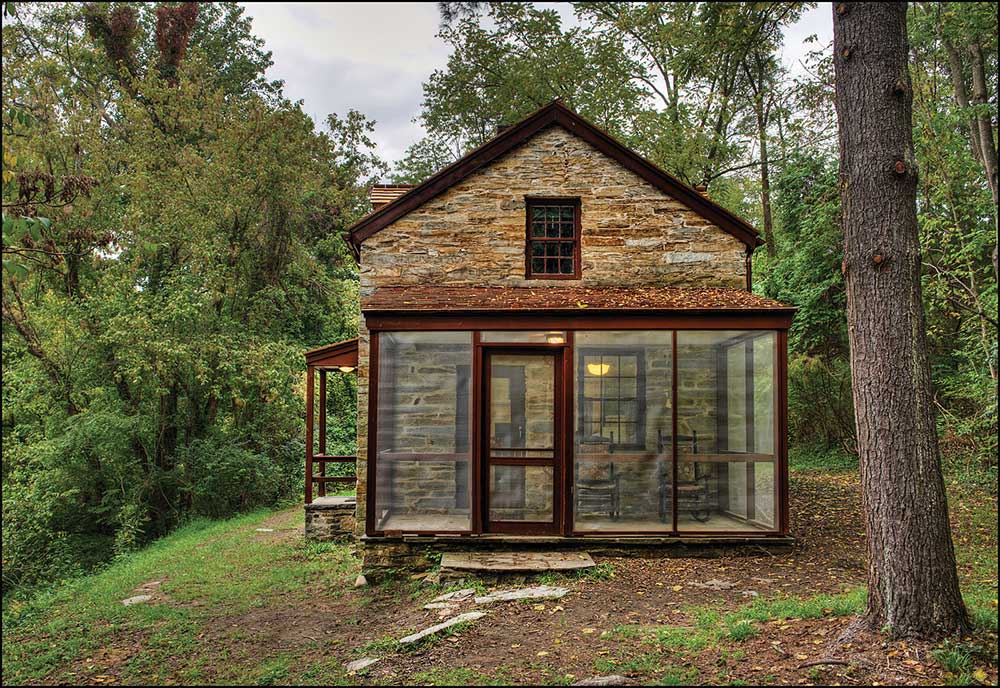
From 1850 to 1924, lock tenders and their families lived in a series of lockhouses built along the Chesapeake & Ohio Canal as they supervised and tended to the boats that would come through. Today, seven of these historic houses have been turned into guest lodging to preserve the history of the canal and the people who helped run it.
Each of the lockhouses sleeps up to eight guests and comes with varying degrees of amenities. The rustic cabins run similar to when they were first built without electricity and running water. Other lockhouses have been upgraded to include the full amenities, including heat and A/C. Stay in all seven cabins to learn about the history of different time periods.
During your visit, you’ll be just steps off of the C&O Towpath and a world of hiking, cycling, climbing, and paddling in the National Historical Park.
Things to Know Before You Go
Price Range: Cost ranges from $110 a night for the rustic lockhouses to $160 a night for the full amenities.
Don’t Forget: Bring your own linens, pillows, towels, and food.
Reservations: Availability depends on the lockhouse and amenities but can fill up six months in advance.
Okefenokee National Wildlife Refuge (Ga.)
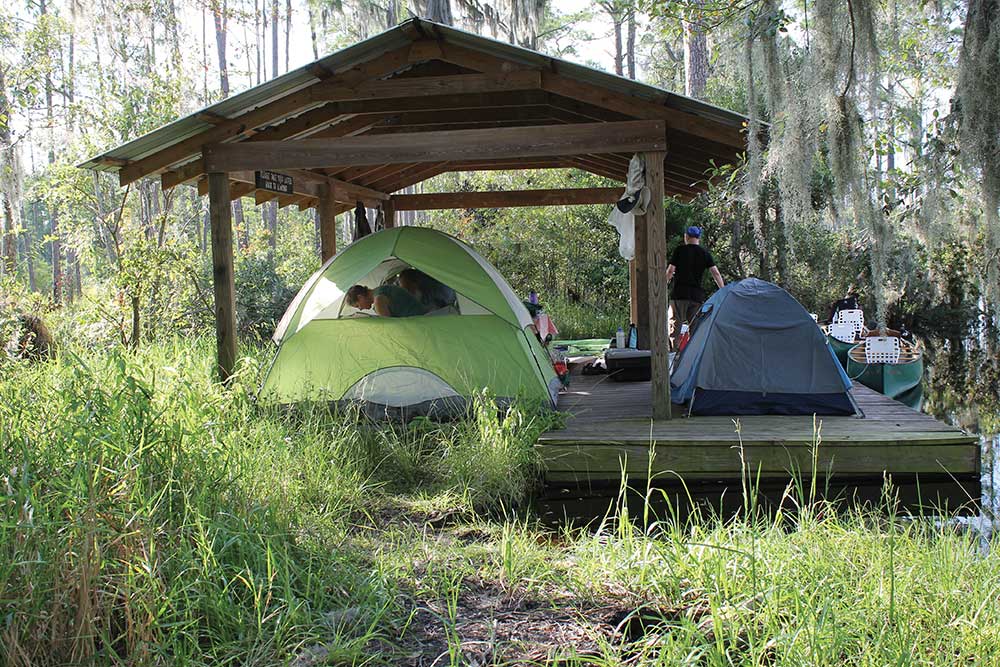
Journey through the cypress forests to the secluded overnight shelters of the Okefenokee National Wildlife Refuge. Pack everything you’ll need for your stay in your kayak or canoe and take off on one of the water trails, varying in difficulty.
As a wildlife refuge, this swamp was protected to support the wildlife of the area and their habitat. Susan Heisey, a supervisory refuge ranger, said Okefenokee is home to between 12,000 to 15,000 American Alligators.
“At one time, American Alligators were an endangered species,” she said. “So, having a large wetland habitat that’s protected like the Okefenokee was integral to the American Alligator’s protection and recovery. They’re no longer on the endangered species list.”
As the largest intact freshwater wetland in North America, you should also look out for the Red-cockaded Woodpecker, an endangered species, herons, and bears during your trip.
Things to Know Before You Go
Price Range: $16 per person, per night
Don’t Forget: Sunscreen, mosquito repellent, and plenty of water. You can also download the Discover Nature Wilderness app for maps of the water trail system. You will be able to find your location in the refuge even when you lose cell service.
Reservations: You can reserve a campsite up to two months in advance at recreation.gov.
Castaway Caboose (W. Va.)
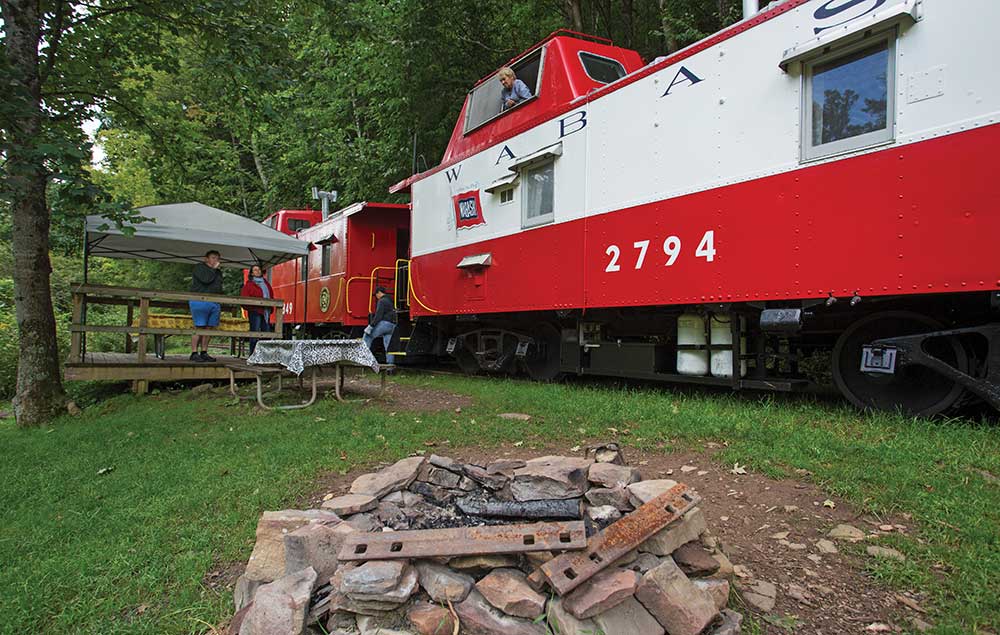
All aboard the Durbin Rocket for a getaway in the Castaway Caboose.
A Heisler No. 6 locomotive pulls the renovated caboose car through the mountains of the West Virginia wilderness to your spot for the night. The conductor will drop you off at a rail spur where you can enjoy the solitude of the location for the night.
This Wabash Railroad car, formerly used in revenue freight service in the mid 1900s, comes equipped with a full-sized shower, a load of firewood, and beds for four adults.
Spend your time swimming, fishing, and hiking along the Greenbrier River and exploring the Monongahela National Forest. At the end of the day, build a campfire in the outside picnic space and fall asleep to the sounds of the forest.
Things to Know Before You Go
Price Range: $330 for a night. Each additional night is discounted.
Don’t Forget: There is no cell service at your remote site
Reservations: Recommended eight to ten months in advance. Weekends sell quicker.
Potomac Appalachian Trail Club Cabins (Pa., Md., W. Va., and Va.)
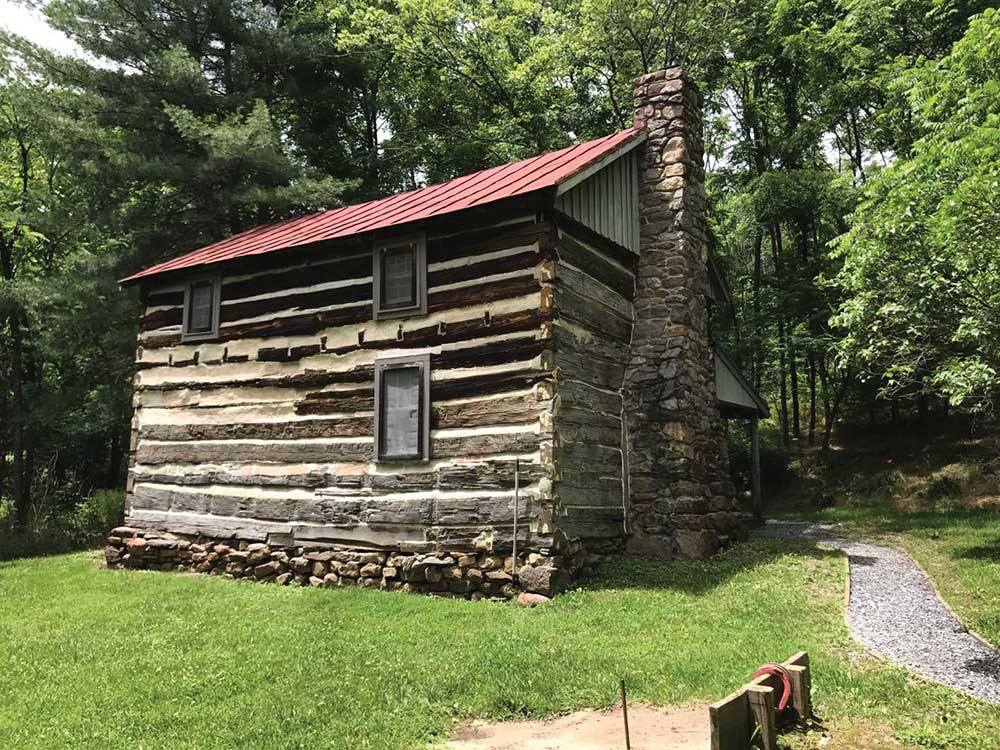
The PATC maintains about 1,100 miles of trail, including part of the Appalachian and Tuscarora Trail. They also take care of 42 cabins across the region, available for rent throughout the year.
Appreciate the history of these cabins, many of them built by the Civilian Conservation Corps, local moonshiners, and PATC members.
Spend the night at one of six cabins in Shenandoah National Park. Explore more than 200,000 acres of protected land by foot on the 500 miles of trails or by car along Skyline Drive. View the park from Mutton Top, located on High Top Mountain.
Stay in Tulip Tree, a cabin constructed by PATC volunteers using native materials and primitive hand tools in the 1990s. Take a trip to Michaux State Forest in Pennsylvania and bunk in a former ranger’s cabin.
These cabins can fit anywhere from four to 14 guests, so choose one that suits your needs the best. Be prepared to hike in your supplies anywhere from 100 yards to four miles to most of the cabins.
Things to Know Before You Go
Price Range: $25 to $175 per night depending on amenities.
Don’t Forget: Cabins are maintained entirely by volunteers. Help keep them clean and leave them as you found it.
Reservations: 17 of the cabins are open to the public. An additional 25 cabins are available for PATC members only.
Charit Creek Lodge (Tenn.)
Located in Big South Fork National River and Recreation Area, Charit Creek Lodge is only accessible by foot, bike, or horseback.
According to the National Park Architecture Society, the lodge may be the oldest operating lodge in the National Park System. The original cabin, built in 1817, is still a part of the structure.
Immerse yourself in the woods when you stay in a suspended tree tent. Pack your sleeping bag and spend the night off the ground. Or take advantage of several rustic cabins with enough room for anywhere from two people up to 12. Either way you choose to stay, you’ll be surrounded by nature.
The full-service package includes two homemade meals featuring ingredients grown on the property. Breakfast and dinner are served family style.
Explore all the Cumberland Plateau and Big South Fork has to offer, from whitewater paddling and mountain biking to hiking and rock climbing. All of which are easily accessible just a few miles from the lodge.
Things to Know Before You Go
Price Range: $60 per person in a tree tent. $80 to $120 per person for a cabin. $20 discount during the week.
Don’t Forget: There is no electricity, phone service, or Wi-Fi at the lodge.
Reservations: Weekends book up to a year in advance.
Woods Hole Hostel (Va.)
Located a mile and a half from their closest neighbor and surrounded by the George Washington and Jefferson National Forest, Woods Hole Hostel sees a mix of section hikers, thru hikers, and people just wanting to get away.
Neville Harris, who took over the hostel from her grandmother, said she emphasizes community among her guests through the preparation of communal breakfast and dinner.
“It’s not that they just come, they stay, they leave,” she said. “I request that people participate in the cleanup of the space. I request they participate in their experience. They leave feeling like they take ownership of the space.”
Meals include organic vegetables grown on site and homemade bread baked daily.
In addition to offering a room to stay just a half mile off of the Appalachian Trail, the hostel is located in the perfect spot for other outdoor recreation. Bring your own mountain bike or rent one from a local outfitter and hit the trails nearby. Explore the river at the base of the mountain. Ask Harris for a yoga class or private art lesson. Read and visit with other guests on the porch.
Things to Know Before You Go
Price Range: $22 per night for a bed in the bunkhouse, $98 a night for an indoor room. Long distance hikers receive a discounted rate. A sliding scale is also available for those who cannot afford to pay full prices.
Don’t Forget: Contribute to the Broke Hiker Jar to help out hikers on a budget.
Reservations: April through June are the busy months as northbound hikers pass through. The rest of the year tends to be quieter.
Congaree National Park (S.C.)
Experience the old-growth forests and swamps of Congaree National Park for a weekend.
Hike in your supplies to the Bluff Campground or paddle in to a backcountry spot. This park is ideal for those looking to rough it and live without the trappings of modern life for a few days. Motorized transportation is not allowed past the parking lot at the visitor center.
Walk 2.4 miles of boardwalk as it loops around Weston Lake and Congaree floodplain. An additional 25 miles of hiking trails are accessible throughout the wilderness. Paddle the marked canoe trail on Cedar Creek to view the park by water. Keep an eye out for river otter, turtles, the occasional alligator while you are out there.
Things to Know Before You Go
Price Range: Campground sites range from $5 for an individual site to $20 for a group site. Backcountry camping is free, permit required.
Don’t Forget: Be prepared for any kind of weather. And insects, including mosquitos, ticks, deer flies, and chiggers.
Reservations: Up to six months in advance. Busy seasons are March through early June and late September through November.
Red River Gorgeous (Ky.)
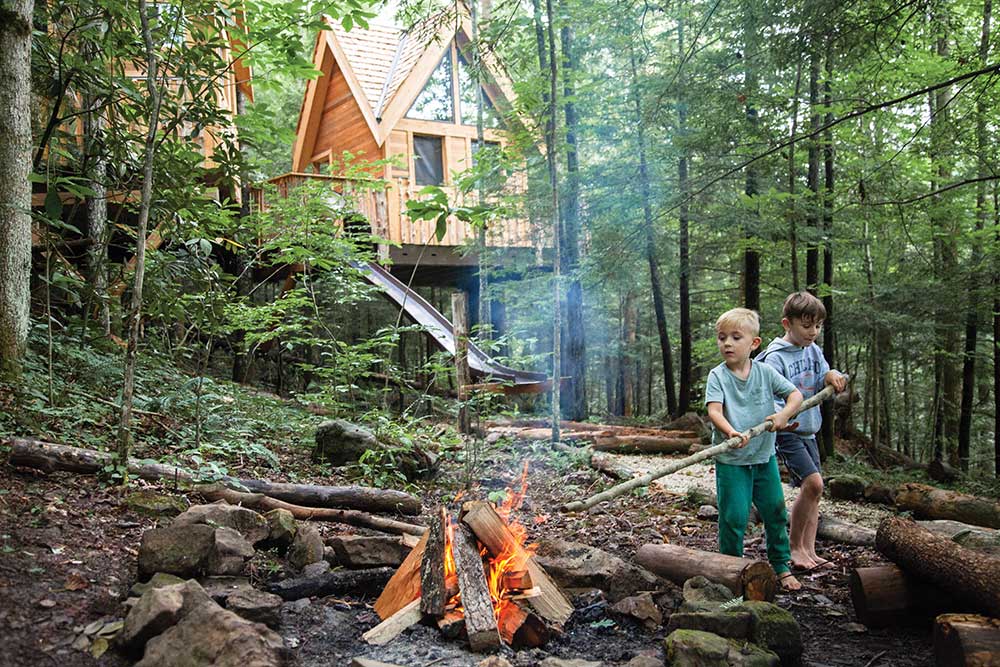
Choose from a variety of overnight options at this family-run lodging destination, now in its third generation of caretakers.
Thrill seekers will enjoy a stay in one of the treehouses high up in the forest canopy, complete with spring-fed hot tubs, slides, skylights, suspended hammocks, and wrap-around porches.
Heights not your style? Disconnect and relax in one of the off the grid cabins. Other lodging includes hike in only, full amenity cabins, and easy road access to fit your needs.
Built in the Red River Gorge area and Daniel Boone National Forest, outdoor adventure is waiting for you right out your back door. While you’re visiting, soar above the trees on a zipline tour, horseback ride on mountain trails, rock climb in the gorge, raft the river, or visit Natural Bridge.
Things to Know Before You Go
Price Range: $70 to $600 a night depending on the structure and amenities. Prices are lower in January and February during the offseason.
Don’t Forget: Decide what level of adventure and solitude you’re looking for before making a reservation.
Reservations: Peak months are March, September, and October.
Dale Hollow Lake (Ky. and Tenn.)
Pull up to a lakeside primitive camping site at Dale Hollow Lake and enjoy a stretch of beach or an island [almost] to yourself. Most of these sites are only accessible by boat, although a few you can drive, hike, or horseback ride to.
Know what primitive camping means before you book this site. No one will be coming around to check on you during your stay. If you’re looking for something a little more structured, spend the night at one of four campgrounds onsite or rent a houseboat for the weekend.
Take advantage of all the recreational opportunities on the lake, from fishing for smallmouth bass and scuba diving to hiking along the 620 miles of shoreline. Watch for the bald eagles known to nest in the area.
Things to Know Before You Go
Price Range: $3 per night
Don’t Forget: Check the firewood policy online before you go to protect the area from invasive species.
Reservations: Up to six months in advance on recreation.gov.
Our Mountain Getaways October Issue is on stands now! Check it out for more mountainous adventure HERE
More Places to Stay:
Blue Moon Rising (Md.) At Blue Moon Rising, the idea is that nothing goes to waste. All of the trees cut down and dirt removed to build these tiny houses were then used in other places on the property. Explore the 14 sustainable cabins on site.
Roanoke Boutique Hotel (Va.) This bed and breakfast, designed by and for outdoor enthusiasts, is just minutes away from the Blue Ridge Parkway, Appalachian Trail, Carvins Cove, and the Roanoke River. Keep your bike and gear in their secure storage space.
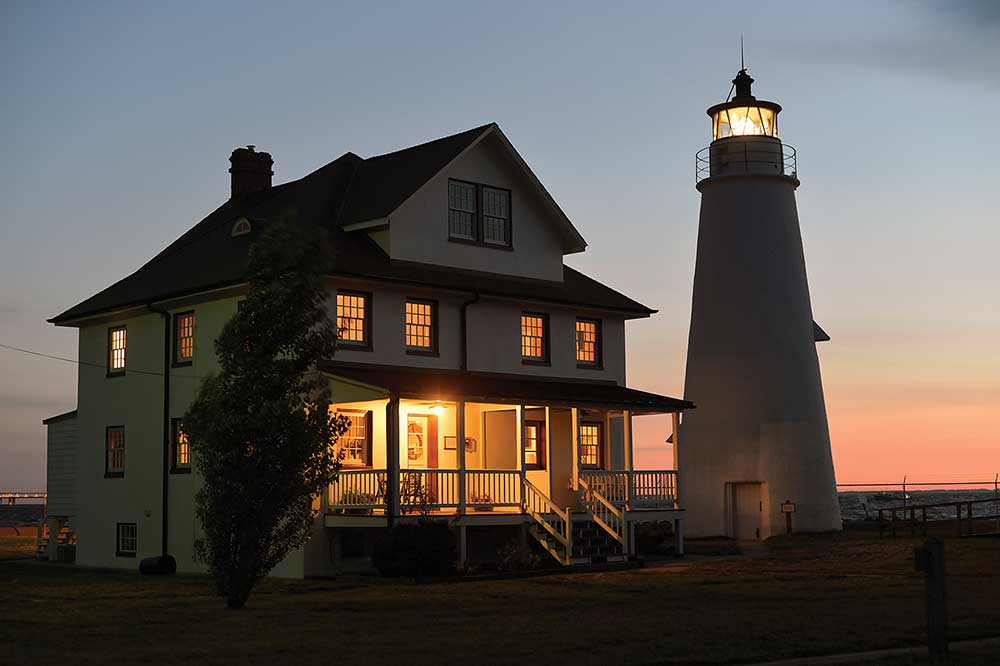
Cove Point Lighthouse (Md.) Rent the Cove Point Lighthouse keeper’s home, situated right on the Chesapeake Bay. The house includes a table made out of reclaimed wood from the original lighthouse.
Jule’s Undersea Lodge (Fla.) Dive 21 feet underwater for a stay at Jule’s Undersea Lodge in Emerald Lagoon. Visitors must be SCUBA certified before they can make the journey to one of the staterooms.
LeConte Lodge (N.C.) Surrounded by Great Smoky Mountain National Park, LeConte Lodge is only accessible on foot. Trails to the top of the mountain range from 5.5 to eight miles. Take in the views and serenity as you spend a night on the third highest peak in the park.
Unicoi State Park (Ga.) Sleep among the trees in the “Squirrel’s Nest” at Unicoi State Park. Take advantage of paddleboard lessons, mountain biking, and more while you’re in the area.
